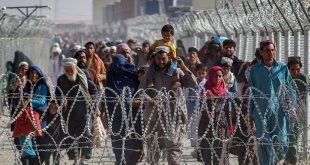Mohammad Parwiz Arian
KABUL: Secretary-General of the Norwegian Refugee Council, Jan Egeland expressed concerns over economical challenges in Afghanistan, saying that the country is on a countdown to economic collapse.
Mr. Egeland arrived in Kabul on Sunday and will leave the country on Tuesday. His visit to the war-torn country comes after the collapse of the former government to the Taliban. Mr. Egeland is due to visit the displaced families and vulnerable people. He will also hold talks with the Afghan officials to discuss humanitarian assistance to the people of Afghanistan.

“Afghanistan’s economy is spiraling out of control. The formal banking system could collapse any day now because of a lack of cash. I’ve spoken to families who tell me they are surviving on tea and small scraps of old bread,” the Norwegian Refugee Council quoted Mr. Egeland as saying “If the economy collapses, even the most basic services will no longer function, and humanitarian needs will soar even higher. Dealing with the liquidity crisis is critical as aid organizations seek to scale up to meet urgent humanitarian needs.”
He voiced frustration over the lack of enough time to “save lives before the harsh winter arrives and temperatures drop to as low as minus 20 degrees Celsius.”
He said that hundreds of thousands of displaced people are in urgent need of shelters, warm clothes, and food. “Already, one in three Afghans do not know where their next meal will come from,” he added.

“Our own staffs tell me they are struggling to withdraw cash to buy food or access their savings from banks. We have been unable to pay staff their full salaries because it has been impossible to securely get money into the country. Imagine this situation multiplied for every employer across the country.
Mr. Egeland called on the UN member states to immediately broker a multilateral agreement to stabilize the economy and facilitate appropriate public services.
“This means exploring new and existing mechanisms, whether by channeling international funding through UN trust funds or through humanitarian organizations as an interim measure. Otherwise, their promises to continue supporting the Afghan people will be empty,” he suggested.
“Donors must focus on providing fast and efficient solutions to delivering urgent aid for children, women, and men that simply cannot wait any longer. The country is on a countdown to economic collapse – we must support the Afghan people no matter what.”
This comes as according to findings issued, over 18 million Afghans rely on humanitarian assistance to survive. Some 664,000 people have been displaced by the latest waves of violence since January, bringing the total number of internally displaced people to more than 3.5 million.
The World Food Program put the number of people facing acute starvation to One in three Afghans. According to the organization, more than 93 percent of households consumed insufficient food in the past week. Since 2009 more than 40,000 Afghans lost their lives as a result of relentless conflicts.
 Afghanistan Times
Afghanistan Times




